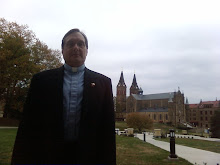2 Sm 12:7-10, 13
Gal 2:16, 19-21
Lk 7:36—8:3
There is a song by Don Henley entitled The Heart of the Matter. One line of the song says, "I've been trying to get down to the heart of the matter, but my will gets weak and my thoughts seem to scatter, but I think it's about forgiveness, even if you don't love me anymore..."
It's about forgiveness. All of us have need for forgiveness. All of us need to forgive. This is just a simple fact of human relationships. We will find a way to do something to someone that requires seeking forgiveness. We will all find a time we need to forgive. Neither of these is an easy thing to do. To look at someone who has hurt you in some way, done something to you, and to forgive them, well that's not easy. To swallow your pride, and go to someone you have hurt and ask for forgiveness, not an easy thing. The possibility of rejection is huge. Which, however, is more difficult, living with the pain caused you by another, nursing it, holding on to it, having it infect the rest of your life, or looking past the pain, past the hurt, and acting in love by forgiving. Maybe this person doesn't want your forgiveness, maybe they don't think they need it. Which is more difficult, living with the knowledge that you harmed another in some way, perhaps feeling guilty, and having that infect the rest of your life, or seeking forgiveness, trying to make amends, to atone for your transgression. Maybe the person you need forgiveness from is in no mood to give it, maybe they never will be. Both forgiving or seeking forgiveness are scary. If you really want peace in your life these are your only options. Yes, what was done to you may seem so awful that you can't forgive, what you have done may seem to you to be unforgiveable. David committed murder, cold blooded, calculated murder, so he could marry another man's wife. Murder, the intentional taking of another person's life, what act could be more heinous? Yet when confronted with his sin by Nathan, David admitted his sin and God forgave him. Jesus, eating at the house of Simon the Pharisee, is approached by a woman, a sinner, a public sinner, known to all there as a sinner. The other guests are aghast as she weeps on Christ's feet, bathing them with her tears, drying them with her hair. She anoints Christ's feet with oil and this is just about too much for Simon. How could Christ let this sinful woman touch him? He confronts Christ, but is told that this woman has shown great love. She has also shown great courage. She knew her presence would disturb those at the dinner. She could not be completely sure Christ would not send her away. She had faith, she had love, and she trusted that she could be forgiven, no matter what her sins might be. Just like David, she was forgiven. God's love for us is absolute and unconditional. God's forgiveness is there for the asking. We don't deserve it, we can't earn it, but it is ours because of love. We have all been hurt, we have all caused hurt, we all need forgiveness, we all need to grant forgiveness. It is hard, but e must remember that God forgives, no matter the sin. How can we refuse to forgive if God does? Are we better than God?
Deacon John
The Eleventh Sunday in Ordinary Time
June 13, 2010
Monday, June 14, 2010
Subscribe to:
Post Comments (Atom)









1 comment:
Thanks, I was looking for a tune-up.
Post a Comment